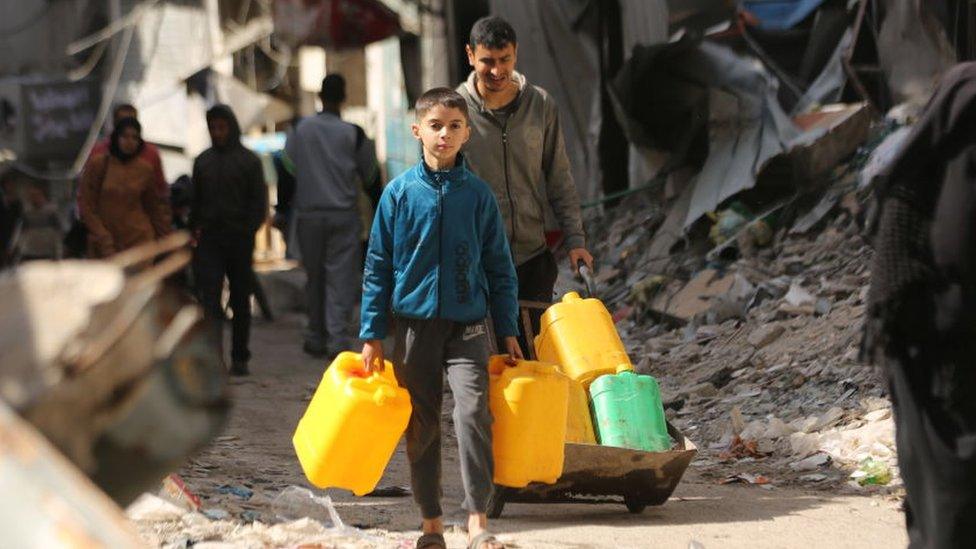Gaza widows and orphans struggle with loss in makeshift camp
- Published
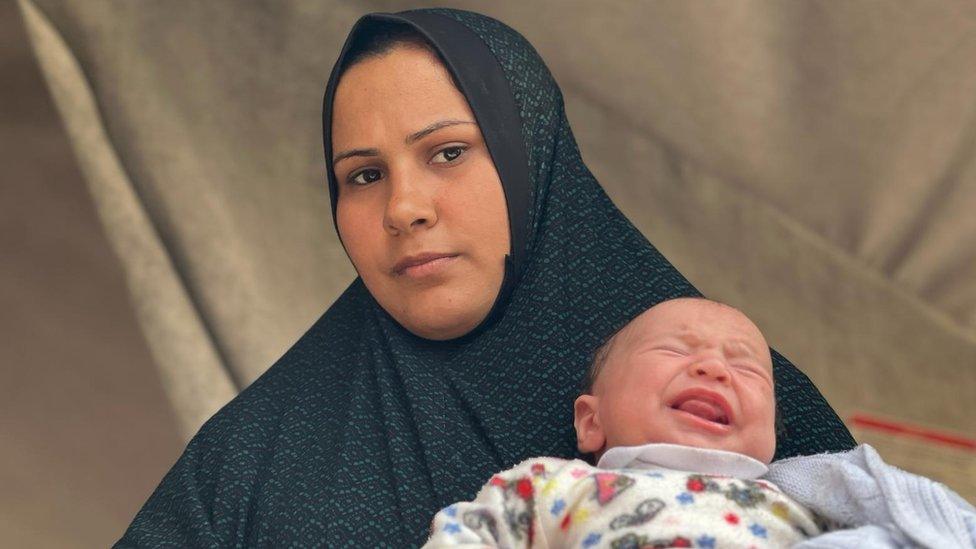
Zouahra says her husband was killed when he was hit in the head by fire from an Israeli gunboat
In the moments when she is not in the tent caring for the children, Zouahra looks out at the sea that forms the western border of her world. On this sunny day it is blue and when the sun sets, gold and red shades will colour the horizon.
It is the same sea that washes the beaches of Tel Aviv to the north, and ebbs and floods along all the coasts of the Mediterranean. And it is the sea from which, Zouahra says, a shell from an Israeli gunboat brought death to her husband.
"He was on his way to the seaside where there were cars and an aid convoy… It was crowded, and the military boats started firing at people. My husband was hit in the head," she says.
That was on 9 February - but Zouahra, who now lives in a section of a camp housing widows and orphans, did not find out immediately.
The 26-year-old mother had just given birth to her fourth child.
At first, the young men who had been at the scene and knew the truth wanted to keep the news from Zouahra. Mahmoud was just late they said.
But she knew something was wrong. Her brother-in-law arrived crying and shouting that Mahmoud was dead. Desperate for the truth, she went to the hospital or, as she puts it, "to the end of the world" - a phrase loaded with foreboding - to find him.
Zouahra leans forward, lowers her head and sobs. Seeing her mother's distress, three-year-old Lana gently touches her arm. Then she softly pats the body of her baby brother Mohammed sleeping on her mum's lap.
Zouahra starts to speak again. "His entire body was connected to machines, and he felt freezing cold. I couldn't talk to him. I tried, but he wasn't responding.
"He was sleeping… He went to get food for his children and came back in a coffin."
The family were scattered by war. They lived in Gaza City before the fighting and after it began they fled to the refugee camp at Al-Nusseirat in the centre of the Gaza Strip. That was the end of Mahmoud's job working as a labourer for the Pioneer Food Company in Gaza.
From Al-Nusseirat, they were again uprooted, fleeing south to Rafah after the Israel Defense Forces told them it was a safe zone.
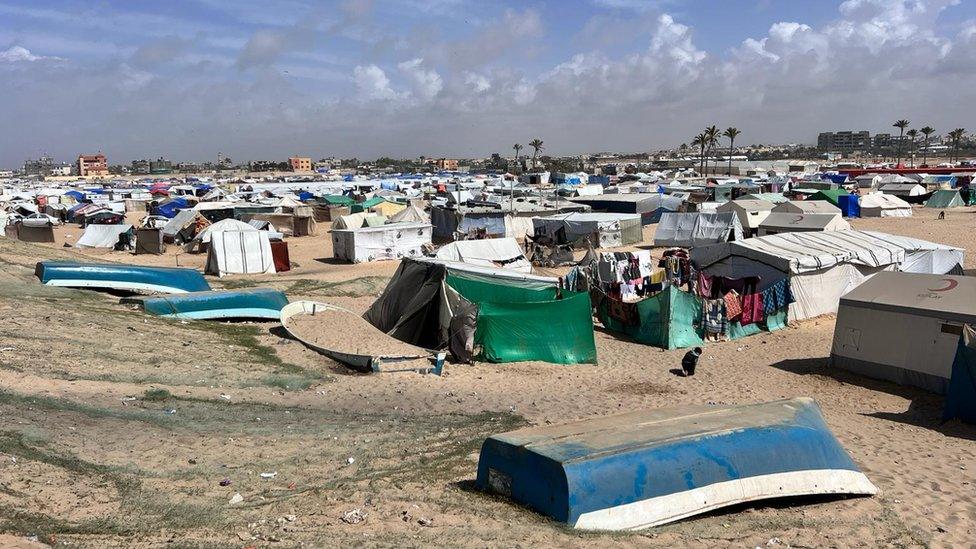
The Al-Mawasi refugee camp houses unaccompanied women and children
Zouahra lives with other widows in a section of the Al-Mawasi refugee camp set aside for unaccompanied women and children. Her neighbour Amina lost her husband and three children in an Israeli air strike on their home near Khan Younis.
Amina and her five-year-old son, Ibrahim - who is also disabled - were pulled alive from the rubble that buried the rest of the family.
Another widow, Amani Jasser Al-Khawr, 32, lost her husband, a policeman, and five of her children in an air strike in Central Gaza in October - and now lives in a shelter made of zinc panels.
The wind rattles the panels, just as it whips the plastic sheeting and cloth that covers Zouahra and her children.
They can see how she struggles. But although her shelter is flimsy and flies constantly settle on the children, the ground has been swept and the family's clothes flap on a washing line outside.
Zouahra shows photographs of her late husband - a handsome man, protective of his family.
"I don't know what to do without him. He was the one providing for me and my children. He never made me need anyone… No-one cares about us now," Zouahra says.
This life piles indignities on the widows. Zouahra needs nappies for the baby and for her disabled boy, Mustafa. She speaks of his constant anxiety.
"He sees something and I can't get it for him. He keeps crying and hitting himself on the ground, asking for it, but I can't provide it.
"Mustafa has many needs that I can't afford. He keeps peeing himself and asks for things that I can't give him. He asks for food, for juice, apples, and fruits, and I can't provide."
A few days ago, another family nearby managed, somehow, to find a chicken. Zouahra's children looked on. They were beside themselves with longing.
Then, three-year-old Lana began to cry. But there was nothing to be done. The other people were lucky, or maybe had some money, and their children could eat.
The widows of Al-Mawasi are waiting for a new camp for unaccompanied women and their children to be completed. There they hope for food, a place to shelter out of the wind - the same way they hope that the killing might stop so that no more will be taken from them.
With additional reporting by Haneen Abdeen and Alice Doyard
Related topics
- Published5 March 2024
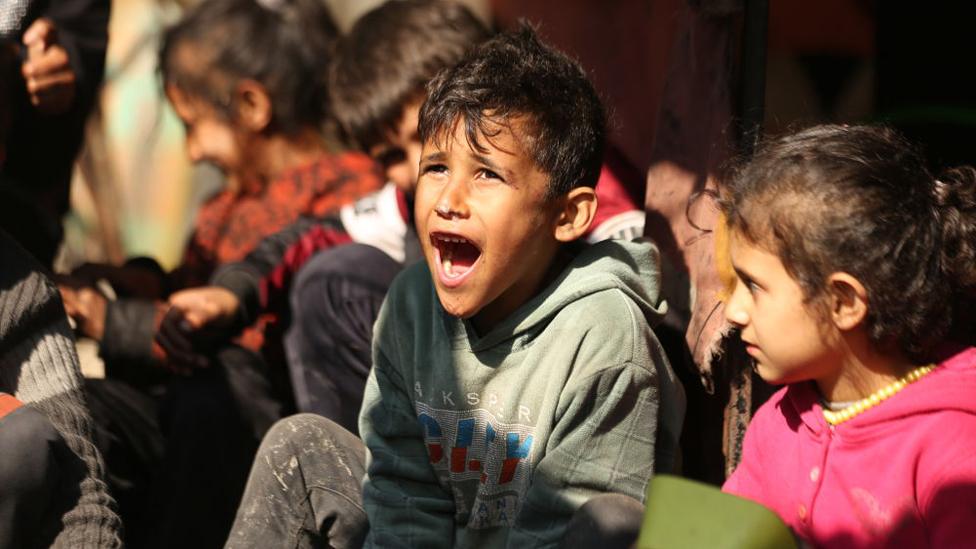
- Published5 March 2024
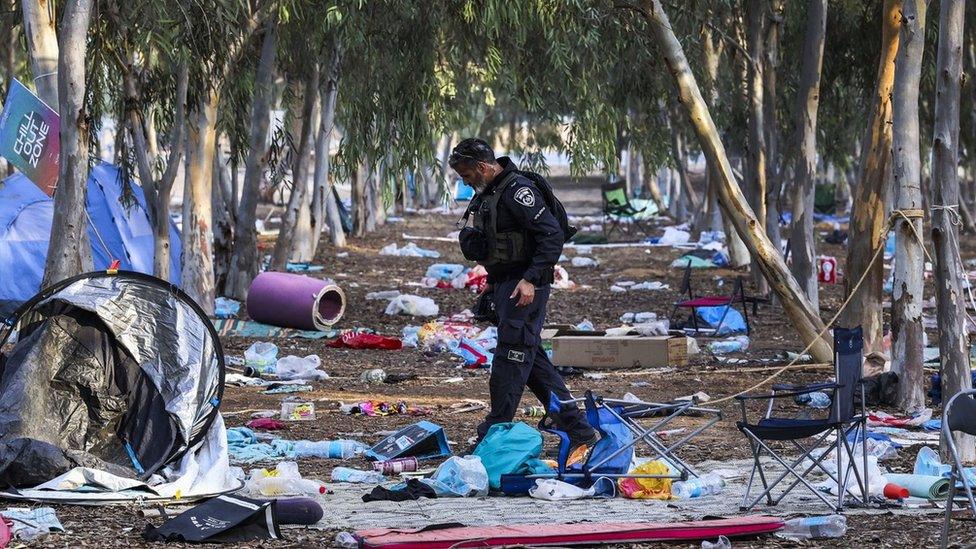
- Published4 March 2024
